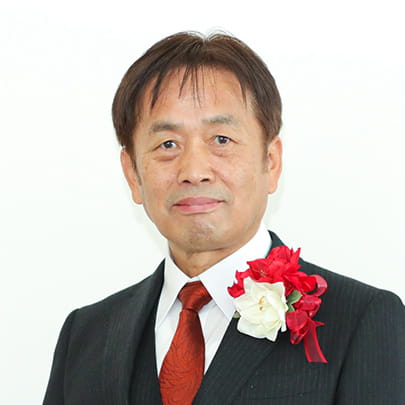He was born in 1948 in Himeshima Village, Oita Prefecture.
He retired from The Tokyo University of Education with a doctoral degree. His specialty is youth education and play theory. He has been involved in teacher training at Chiba University for 37 years and was the Dean of the Faculty of Education. After retiring in 2013, he became The president of Chiba Keiai Junior College. He also served as a member of the Central Council for Education of the Ministry of Education, Culture, Sports, Science and Technology for eight years, and retired in February 2021.He has written many books, including "Why people who weren't hard-working at school are highly educated, have a high income, and are popular with the opposite sex"(Kodansha α new book), "What Can be Taught? What Can't be Taught?"(Sakurasha), and many others.



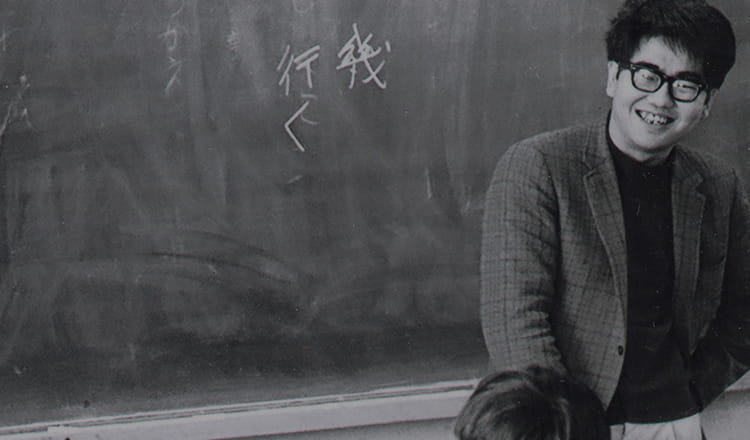
Mukoyama Yoichi Education Award
The "Mukoyama Yoichi Education Award" was established for the development,
dissemination and further development of educational skills.
dissemination and further development of educational skills.
The Mukoyama Yoichi Education Award Winners for 2025 have been selected.
Every last child must be cherished,
without exception.
without exception.
What is the Mukoyama Yoichi Education Award?
The "Mukoyama Yoichi Education Award" was established for the development, dissemination and further development of educational skills.
The following four awards were created.
Ⅰ. Educational Skills Award
Ⅱ. Cutting-edge Practice Award
Ⅲ. Class Management /
Student Guidance Award
Student Guidance Award
Ⅳ. Mukoyama Yoichi Educational
Practical and Research Award
Practical and Research Award
In addition to the above, a Special Achievement Award is sometimes independently bestowed by the committee.
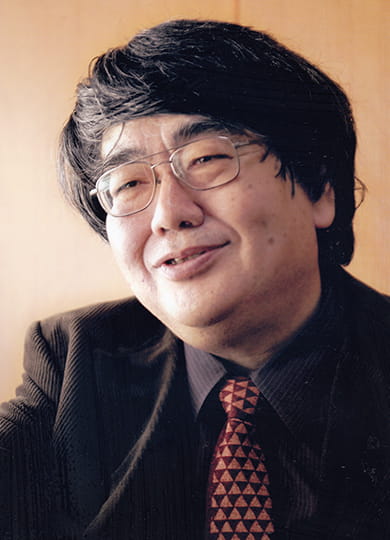
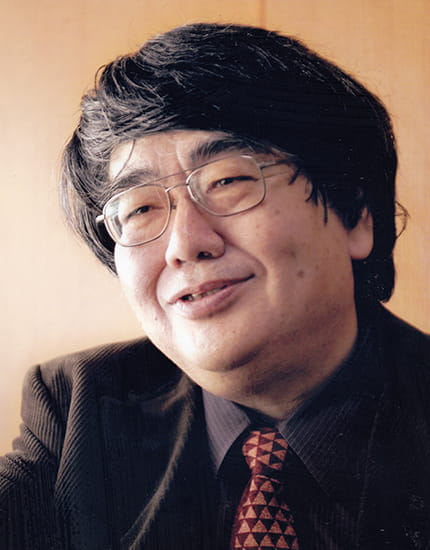
Mukoyama Yoichi
He was born in Tokyo in 1943. He was the former President of the Japan Society for Educational Skills.
Mr. Mukoyama graduated from Tokyo Gakugei University. He had been a teacher at a public elementary school in Tokyo for many years when he founded a new educational movement called 'Kyoikugizyutu no Hosokuka'. Later he presided over TOSS (Teachers' Organisation of Skill Sharing), which still collects excellent educational skills and methods from all over Japan and aims to make them a shared property for all. TOSS is currently the largest educational organization in all of Japan with 700 circles and 10,000 members. He was a creator of school textbook questions for NHK's 'Quiz Omoshiro Seminar', a part-time lecturer at Chiba University, and a visiting professor at Shanghai Normal University.
As editor-in-chief, he also compiled numerous educational magazines such as "Kyoshitsu Two-Way" and "Mukoyama-gata Sansu Oshiekata Kyoshitsu". "Class Collapse," "Monster Parent," "Golden Three Days," etc. are all his coined words.
He has authored, co-authored, and edited over 3,000 books, including "In Pursuit of Kihaku Saito" (Shoheisha), "New Edition: Laws to Improve Your Classroom Skills"(Gakugei Miraisha)", "Destroy the Structure of Bullying" (Meiji Tosho), and "School Failure" (Fusosha).
Official website https://mukoyamayoichi.com/
Mr. Mukoyama graduated from Tokyo Gakugei University. He had been a teacher at a public elementary school in Tokyo for many years when he founded a new educational movement called 'Kyoikugizyutu no Hosokuka'. Later he presided over TOSS (Teachers' Organisation of Skill Sharing), which still collects excellent educational skills and methods from all over Japan and aims to make them a shared property for all. TOSS is currently the largest educational organization in all of Japan with 700 circles and 10,000 members. He was a creator of school textbook questions for NHK's 'Quiz Omoshiro Seminar', a part-time lecturer at Chiba University, and a visiting professor at Shanghai Normal University.
As editor-in-chief, he also compiled numerous educational magazines such as "Kyoshitsu Two-Way" and "Mukoyama-gata Sansu Oshiekata Kyoshitsu". "Class Collapse," "Monster Parent," "Golden Three Days," etc. are all his coined words.
He has authored, co-authored, and edited over 3,000 books, including "In Pursuit of Kihaku Saito" (Shoheisha), "New Edition: Laws to Improve Your Classroom Skills"(Gakugei Miraisha)", "Destroy the Structure of Bullying" (Meiji Tosho), and "School Failure" (Fusosha).
Official website https://mukoyamayoichi.com/
Four Principles of Educational Skills
Mukoyama Yoichi established the following four principles when he founded the "Kyoikugizyutu no Hosokuka" in 1984.
| (1) | There are many various educational skills. TOSS picks up as many methods as possible. (Principle of diversity) |
|---|---|
| (2) | Nothing is set in stone when it comes to educational skills. They are always subject to review and correction. (Principle of continuity) |
| (3) | Claims are based on records that clearly indicate teaching instructions, materials, questions, points to keep in mind, and results. (Principle of demonstrability) |
| (4) | The teachers themselves choose the methods and materials that are suitable for their classes. (Principle of independence) |
The Mukoyama Yoichi Education Award
The "Mukoyama Yoichi Education Award" will set the following four awards based on the submitted papers that have been received.
Ⅰ Educational Skills Award
The best teaching practices and research will be selected from all the submitted papers.
Ⅱ Cutting-edge Practice Award
The best teaching practices and research will be selected from all the submitted papers that work on cutting-edge issues.
Ⅲ Class Management / Student Guidance Award
The best teaching practices and research will be selected from all the submitted papers that work on class management and student guidance where every student is valued without exception.
Ⅳ Mukoyama Yoichi Educational Practical and Research Award
The best teaching practices and research will be selected from all the submitted papers that most deeply research, criticize, verify, plan, and develop the practices, philosophies, and teaching guidelines of Mr. Mukoyama Yoichi.
In addition to the above, a Special Achievement Award is sometimes independently bestowed by the committee.
Ⅰ Educational Skills Award
The best teaching practices and research will be selected from all the submitted papers.
Ⅱ Cutting-edge Practice Award
The best teaching practices and research will be selected from all the submitted papers that work on cutting-edge issues.
Ⅲ Class Management / Student Guidance Award
The best teaching practices and research will be selected from all the submitted papers that work on class management and student guidance where every student is valued without exception.
Ⅳ Mukoyama Yoichi Educational Practical and Research Award
The best teaching practices and research will be selected from all the submitted papers that most deeply research, criticize, verify, plan, and develop the practices, philosophies, and teaching guidelines of Mr. Mukoyama Yoichi.
In addition to the above, a Special Achievement Award is sometimes independently bestowed by the committee.
Qualification Requirements and Application Procedure
Applicants for The Mukoyama Yoichi Education Award MUST either be an individual, group or supporting member of The Japan Society for Educational Skills. Click here for details.
Recommendation Requirements and Application Procedure
Those who can be recommended for the Special Achievement Award may either be an individual, group or supporting member of The Japan Society for Educational Skills. However, those outside of The Japan Society for Educational Skills may still be eligible for an award if someone within the Society nominates them. Click here for details.
Application / Recommendation Period
From the 1st of May, 2025 to the 31st of August, 2025
Awards Ceremony
The winner of each award will be announced and the award ceremony will be held at The Japan Society for Educational Skills. Succussful winners shall be presented with their award along with their prize at the award ceremony. In the case of a recommendation, the supplementary prize will be presented to the person recommended.
The prizes are as follows:
Ⅰ Educational Skills Award: 200,000 yen
Ⅱ Cutting-edge Practice Award: 100,000 yen
Ⅲ Class Management / Student Guidance Award: 100,000 yen
Ⅳ Mukoyama Yoichi Educational Practical and Research Award: 100,000 yen
Special Achievement Award : 100,000 yen
The prizes are as follows:
Ⅰ Educational Skills Award: 200,000 yen
Ⅱ Cutting-edge Practice Award: 100,000 yen
Ⅲ Class Management / Student Guidance Award: 100,000 yen
Ⅳ Mukoyama Yoichi Educational Practical and Research Award: 100,000 yen
Special Achievement Award : 100,000 yen
Chairman of the Celection Committee
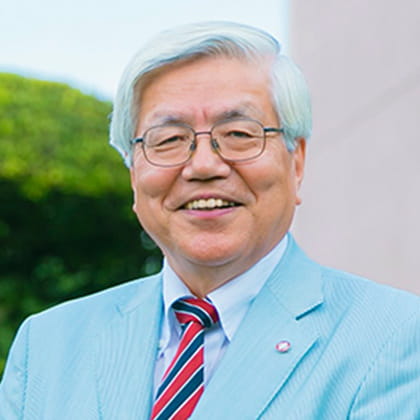
Akashi Yoichi(Professor Emeritus, Chiba University)
Other Members of the Selection Committee
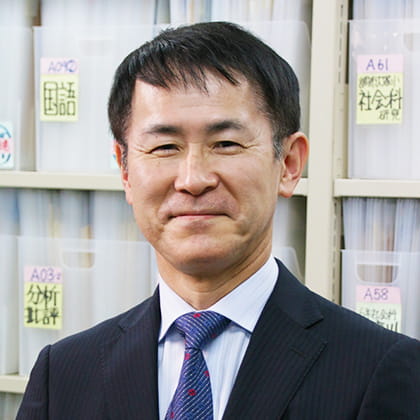
Tani Kazuki(Professor, Tamagawa University Graduate School of Education, Teaching Profession)
Chairman of the Japan Society for Educational Skills.
He completed the master's course at the Hyogo University of Teacher Education. Worked for 22 years as a public elementary school teacher in Hyogo prefecture. While interacting with children as a classroom teacher, he learned excellent educational skills such as "every last child is valued" from Mukoyama Yoichi in his twenties and continues to be active in TOSS. Currently, he is also the president of TOSS and the chairman of the NPO Teachership Project. He focuses on research on teaching methods in each subject, training of teachers' teaching skills, development of teaching materials, and Information and Communication Technology (ICT) education.He has written many books, including "Tani Kazuki's Class Management and Work Techniques" (Sohjinsha), "Teaching Techniques Used by Professional Teachers Who Change Children" (Gakugei Miraisha), and many others.
He completed the master's course at the Hyogo University of Teacher Education. Worked for 22 years as a public elementary school teacher in Hyogo prefecture. While interacting with children as a classroom teacher, he learned excellent educational skills such as "every last child is valued" from Mukoyama Yoichi in his twenties and continues to be active in TOSS. Currently, he is also the president of TOSS and the chairman of the NPO Teachership Project. He focuses on research on teaching methods in each subject, training of teachers' teaching skills, development of teaching materials, and Information and Communication Technology (ICT) education.He has written many books, including "Tani Kazuki's Class Management and Work Techniques" (Sohjinsha), "Teaching Techniques Used by Professional Teachers Who Change Children" (Gakugei Miraisha), and many others.
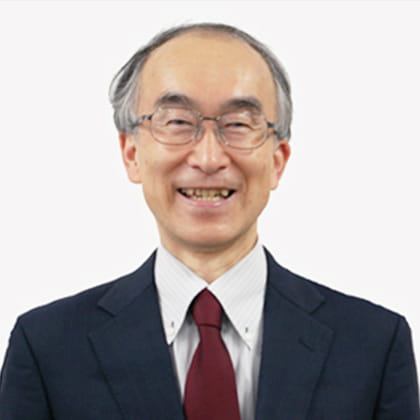
Komori Eiji(Representative of Japan Science Education Support Center)
He was born in Saitama prefecture in 1956.
After working at public junior high schools in Saitama prefecture for 28 years, he worked on unique science room management and science classes with the motto "Science is exciting!". In 2008, he established the Japan Science Education Support Center and started a science education consulting business. He is currently the representative of the Mukoyama-Komori Science Study Group, a certified trainer at the Narika Science Academy, and a lecturer at the Sakitamakai nursery school (playing with science). He is engaged in raising children and teachers who like science. In addition to this society, he belongs to the Japan Society for Science Education and the Chemical Society of Japan Education Subcommittee.He has written many books, including "Classes that make children enthusiastic about Science" (Gakugei Miraisha), "Easy Beautiful Moving! Playing up to 10 years old" (Gakugei Miraisha), and many others.
After working at public junior high schools in Saitama prefecture for 28 years, he worked on unique science room management and science classes with the motto "Science is exciting!". In 2008, he established the Japan Science Education Support Center and started a science education consulting business. He is currently the representative of the Mukoyama-Komori Science Study Group, a certified trainer at the Narika Science Academy, and a lecturer at the Sakitamakai nursery school (playing with science). He is engaged in raising children and teachers who like science. In addition to this society, he belongs to the Japan Society for Science Education and the Chemical Society of Japan Education Subcommittee.He has written many books, including "Classes that make children enthusiastic about Science" (Gakugei Miraisha), "Easy Beautiful Moving! Playing up to 10 years old" (Gakugei Miraisha), and many others.
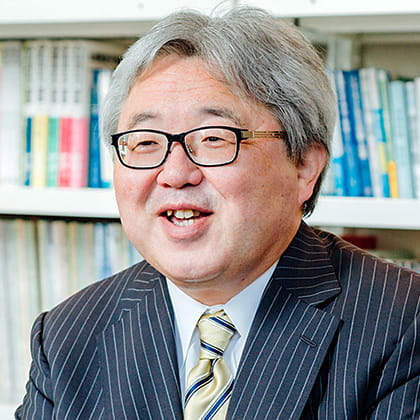
Horita Tatsuya(Professor, Graduate School of Teacher Education, Tokyo Gakugei University)
Currently, he is also a Special inspector of Ministry of Education, Culture, Sports, Science and Technology, and a senior fellow of the National Institute for Educational Policy Research. After graduating from Tokyo Gakugei University, he received his Ph.D. in Educational Technology from the Tokyo Institute of Technology. He started his career as a teacher at a public elementary school in Tokyo, including the Faculty of Education at the University of Toyama, the Faculty of Informatics at Shizuoka University, the National Institute of Multimedia Education, the Graduate School for Teacher Profession at Tamagawa University, and an advisor of the Ministry of Education (joint appointment). Since he was an elementary school teacher, he has had a strong interest in "easy-to-understand teaching methods," that is, educational techniques and methods, and has taken the path of researching ways to utilize ICT. He has served as a member of the Central Council for Education and chair of national conferences on digital textbooks and the use of educational data. He has written many books, including "Next Generation Information Utilization Ability to Foster in the Cloud" (Shogakukan), and many others.
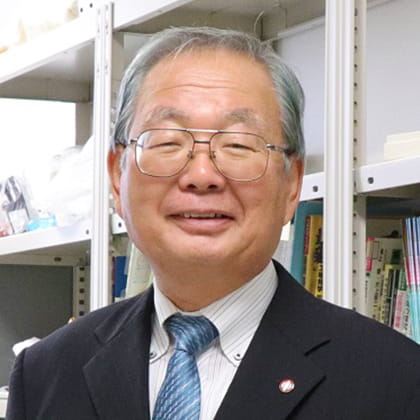
Mukoyama Yukio(Professor Emeritus, Visiting Professor, Keiai University)
Adviser of the National Union Elementary School Chiefs Association.
After working as a public school teacher, he was the director of the Bunkyo Ward Board of Education, the director of the Tokyo Metropolitan Board of Education, the director of the Shinagawa Ward Board of Education, the director of Seiwa Elementary School of Katsushika Ward, the director of Sakamoto Elementary School of Chuo Ward, and the director of Taimei Elementary School. Served as a kindergarten director. He has also served as the president of the National Union Elementary School Directors' Association, president of the Tokyo Public Elementary School Directors' Association, and a professor at the Graduate School of Education, Teikyo University.He has written many books, including "Theory for Heisei School Principals" (Daiichi Kohosha), "Notes on Self-Enlightenment as a New Leader for Veteran Teachers" (Meiji Tosho), and "Theory of Heisei School Creation" (Daiichi Kohosya), "Heisei School Yearbook" (Daiichi Kohosha), "33 Principles for an Aspiring Vice-principal" (Kyoiku Kaihatu Kenkyusyo), and many others.
After working as a public school teacher, he was the director of the Bunkyo Ward Board of Education, the director of the Tokyo Metropolitan Board of Education, the director of the Shinagawa Ward Board of Education, the director of Seiwa Elementary School of Katsushika Ward, the director of Sakamoto Elementary School of Chuo Ward, and the director of Taimei Elementary School. Served as a kindergarten director. He has also served as the president of the National Union Elementary School Directors' Association, president of the Tokyo Public Elementary School Directors' Association, and a professor at the Graduate School of Education, Teikyo University.He has written many books, including "Theory for Heisei School Principals" (Daiichi Kohosha), "Notes on Self-Enlightenment as a New Leader for Veteran Teachers" (Meiji Tosho), and "Theory of Heisei School Creation" (Daiichi Kohosya), "Heisei School Yearbook" (Daiichi Kohosha), "33 Principles for an Aspiring Vice-principal" (Kyoiku Kaihatu Kenkyusyo), and many others.
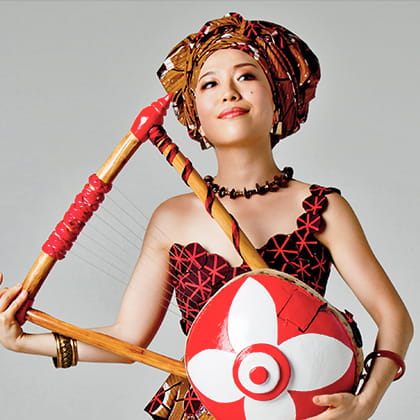
Photo by Miura Mariko
Anyango(Nyatiti player, Japan-Kenya cultural goodwill ambassador)
Mukoyama Eriko, also known as Anyango.
Fascinated by African music, she trained alone in a village in the hinterland of Kenya and became the world's first female player of Nyatiti (musical instrument), which was only allowed to be played by a limited number of local men. Anyango is a Luo word meaning "a girl born in the morning". She has performed widely in Japan, Africa, Europe, etc., and has also performed at elementary and junior high schools all over Japan as a Japanese Kenyan Cultural Goodwill Ambassador.In 2022, the 9th album "AOKO" was released. She has written many books, including "The Law of Grasping Dreams" (Kadokawa Gakugei Shuppan) and "Song of Nyatiti" (Gakugei Miraisha).
Official website https://anyango.com
Fascinated by African music, she trained alone in a village in the hinterland of Kenya and became the world's first female player of Nyatiti (musical instrument), which was only allowed to be played by a limited number of local men. Anyango is a Luo word meaning "a girl born in the morning". She has performed widely in Japan, Africa, Europe, etc., and has also performed at elementary and junior high schools all over Japan as a Japanese Kenyan Cultural Goodwill Ambassador.In 2022, the 9th album "AOKO" was released. She has written many books, including "The Law of Grasping Dreams" (Kadokawa Gakugei Shuppan) and "Song of Nyatiti" (Gakugei Miraisha).
Official website https://anyango.com
2025 Award Winners

Ⅰ Educational Skills Award
Matsuda Haruki
Examining Yoichi Mukoyama’s ‘Enthusiastic Lessons’: From Play-Oriented Classification to Theoretical Modeling

Ⅱ Cutting-edge Practice Award
Kawahara Masaki
Proposed Model of Inclusive Education in Japan:Implementing Inclusive Education in Japan Inspired by Practices Observed in Boston, Massachusetts

Ⅲ Class Management / Student Guidance Award
Isami Kazuyo
Teaching methods to improve fine motor skills in first-grade elementary school children with DCD (Developmental Coordination Disorder) or clumsiness due to lack of experience.

Ⅲ Class Management / Student Guidance Award
Sato Tomohiko Hirayama Yasushi
Developing Effective Instructional Methods to Foster Mathematical Vocabulary Comprehension:A Flashcard-Based Intervention for Third Graders

Ⅳ Mukoyama Yoichi Educational Practical and Research Award
Ota Masao
Cultivating Students’ Motivation for Expressive Movement:A 12-Hour Practice and Analysis of Students’ Verbal Data in a Sixth-Grade Class

Special Achievement Award
Takei Hisashi
A Practical Study on a Professional Development Package Centered on Support Sheets: Sharing Expertise in Special Needs Education

Special Achievement Award
Kimura Shigeo
Applying the Mukoyama-Style Method to University Math Teaching:Effective Strategies in Numerical Reasoning Classes for Civil Service Exams
2024 Award Winners
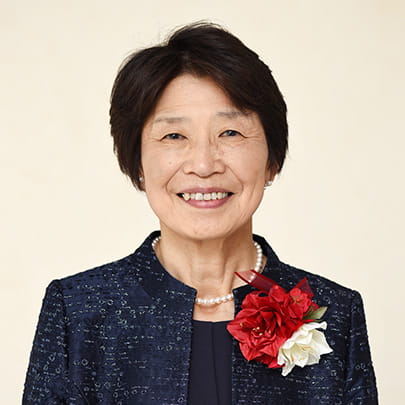
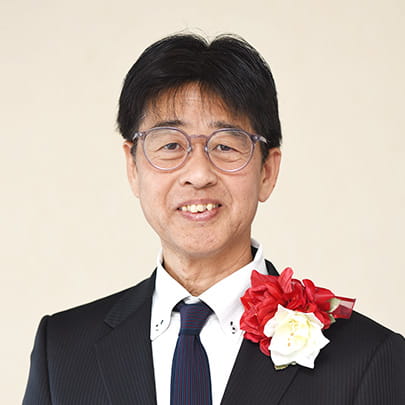
Ⅱ Cutting-edge Practice Award
Kawahara Masaki
Development of the Mukoyama-Style Social Studies AI : Incorporating Yoichi Mukoyama's Social Studies Practical Data into AI for Future Utilization
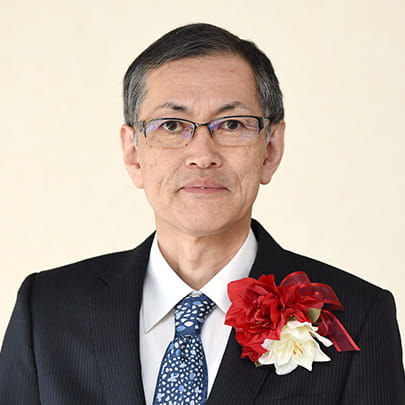
Ⅱ Cutting-edge Practice Award
Mizuno Shoji
Creating Developmental Education With Yoichi Mukoyama's "Principles of Quizzes" : How to Increase High School Students' Motivation to Learn Using Gamification Techniques
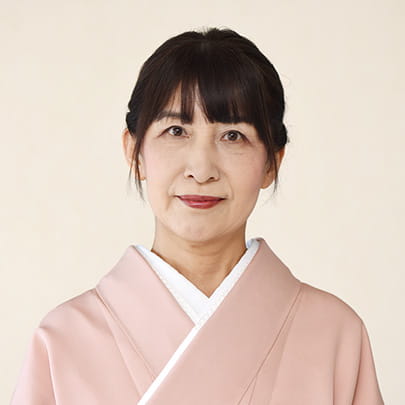
Ⅲ Class Management / Student Guidance Award
Isami Kazuyo
Research on "Teaching Hiragana With Special Syllables" : Methods for Clearly Teaching Special Hiragana Syllables That First Graders Often Struggle With
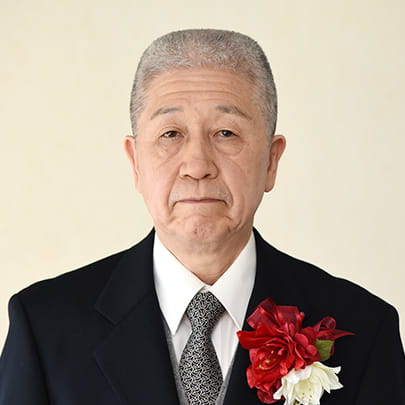
Ⅳ Mukoyama Yoichi Educational Practical and Research Award
Itakura Hiroyuki
The Realities and Future Aspirations of Mukaiyama's Practical Discussion Classes : Exploring Intellectual Inquiry-Based Classes
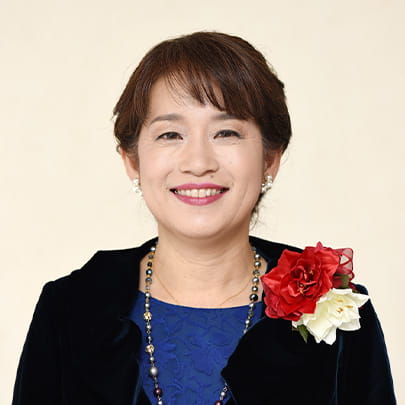
2023 Award Winners
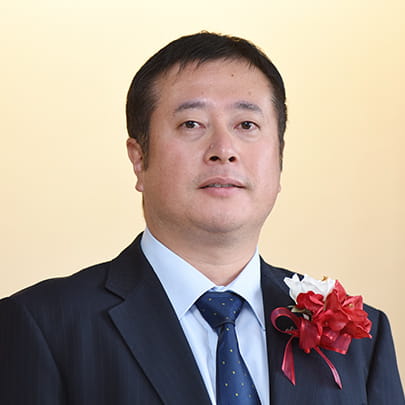
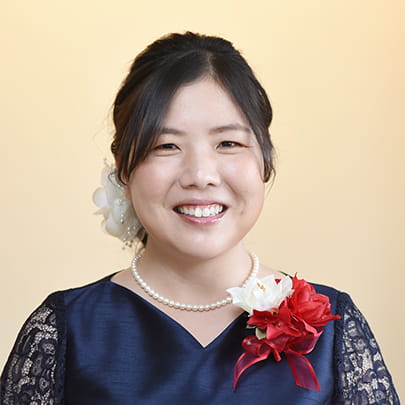
Ⅱ Cutting-edge Practice Award
Yasue Ai
Workstyle Reforms Across Schools to Reduce Overtime Hours: Things I Can Do as the Head of School Affairs
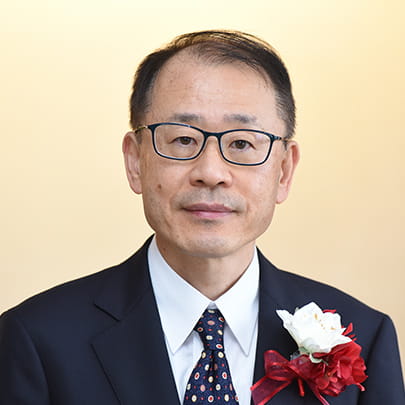
Ⅲ Class Management / Student Guidance Award
Igarashi Katsuyoshi
Developing and Sustaining Social Living Skills for Children with Mental Disabilities: Strategies for Home Chores Instruction at School and Home Continuation
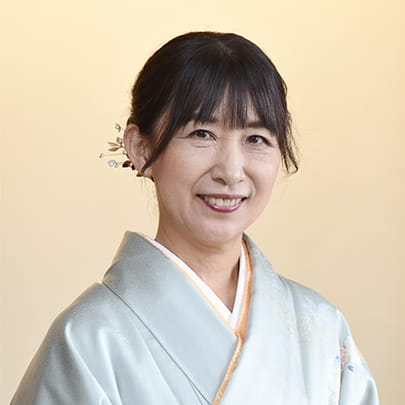
Ⅲ Class Management / Student Guidance Award
Isami Kazuyo
Educational Research on First-Grade Mastery of Hiragana Characters: Validating Hiragana Teaching Methods Based on Five Years of Reading and Writing Survey Data
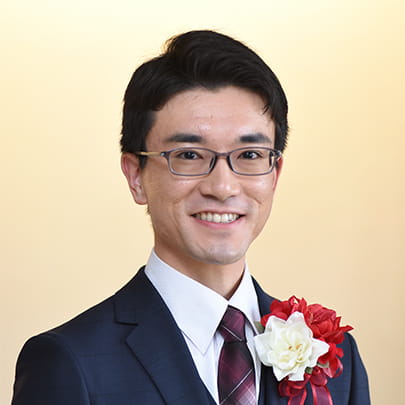
Ⅳ Mukoyama Yoichi Educational Practical and Research Award
Tanaka Taishi
A Study of Mukoyama Yoichi's "Enthusiastic Classroom" Based on Flow Theory
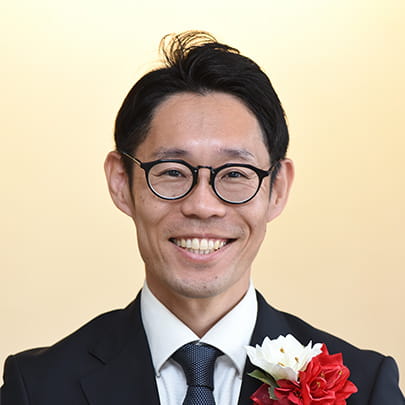
Ⅳ Mukoyama Yoichi Educational Practical and Research Award
Hirayama Yasushi
A Study on Bullying Detection and Response System and its Operation: Based on Insights from Interviews with In-School Practitioners of Mukoyama Yoichi's Bullying Detection and Response System
2022 Award Winners
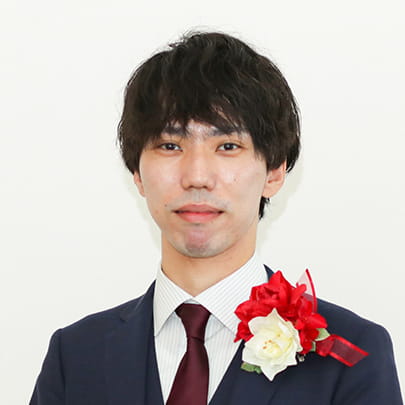
Ⅰ Educational Skills Award
Shirasugi Ryo
Classification and Consideration of Instructional Skills Based on Self-Regulated Learning Theory
Theoretical Systematization of Instructional Skills
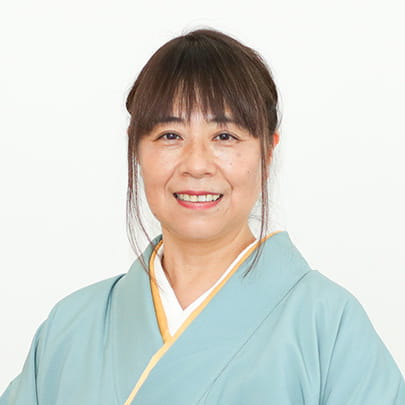
Ⅱ Cutting-edge Practice Award
Tatano Tomoko
Training Young Teachers to Revitalize Schools:
Utilizing Educational Technology
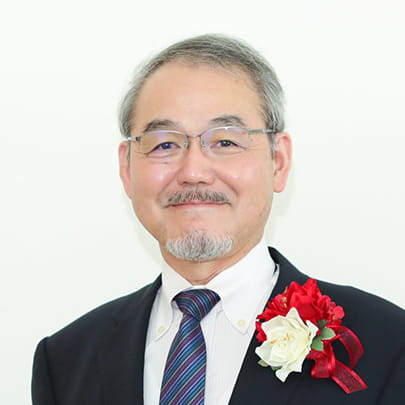
Ⅲ Class Management / Student Guidance Award
Matsuzaki Tsutomu
A Four-Year Study in Which the Entire School Worked to Improve Academic Ability: Verifying the Eight Measures Comparing Results from 2017 (before the study) to 2021 (after the study)
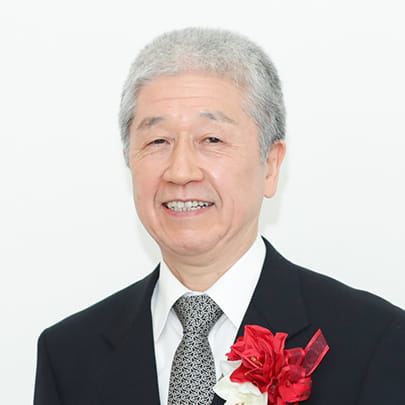
Ⅳ Mukoyama Yoichi Educational Practical and Research Award
Itakura Hiroyuki
A Study on the Significance of Mukoyama Teaching Methods in Kanji Education: Characteristics of Mukoyama-Style Teaching Methods Necessary to Move from 'Rote Learning' to 'Thinking Learning'
Contact
Mukoyama Yoichi Education Award
Selection Committee
2-4-12 Hatanodai, Shinagawa-ku,
Tokyo 142-0064
info@mukoyama-award.com
Selection Committee
2-4-12 Hatanodai, Shinagawa-ku,
Tokyo 142-0064
info@mukoyama-award.com







